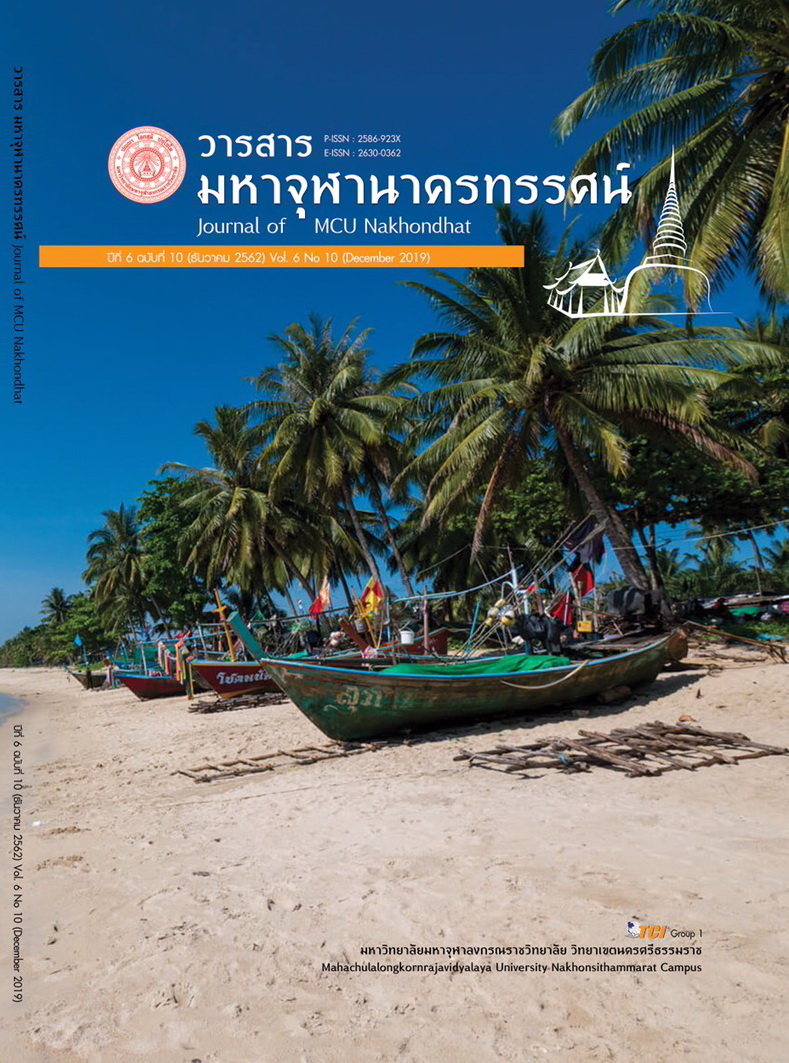COMMUNITY SELF-MANAGEMENT IN KHUNTHURI SWAMP FOREST MANAGEMENT ACCORDING TO THE FOUR NOBLE TRUTHS
Main Article Content
Abstract
The purpose of this research study is 1) to study dynamics of KhunThuri. 2) To study community self-management of KhunThuri. 3) To apply the Noble Truths to be used as guidelines for self-management of communities in the management of KhunThuri. and 4) To study new patterns and knowledge in the management of KhunThuri swamp forest according to the Noble Truths of balance and sustainability. This research is a qualitative research, data collection by documents, indept interview with a Purposive selection. Key Information such as 1) Government agency 2) scholar 3) public/praschcommunity and 4) The leader of swamp conservation total of 10 person. By using the analytical study to the integration and creation of new knowledge.
The research found that:
- The dynamics of KhunThuri swamp forest is divided into 3 eras is 1) The fertile forest. 2) The natural disaster and 3) The commercial agriculture. The characteristics of use include using wood, find forest products, poaching, palm oil and orchards plant etc. There are 2 factors which are 1) with in community factor such as base on swamp forest resource and community learning process and 2) External community factor such as the government policy was change and the entrance of various groups and organization to access network resources have 3 groups 1) forest user group 2) forest conservation group and 3) forest trespasser group.
- The community self-management is to use wisdom and knowledge in the adaptation and creation of shared consciousness. Management swamp 1) swamp forest knowledge 2) swamp forest management process 3) wisdom leader or folk philosopher 4) network creation and 5) relationship coordinator.
- To application is 4 Noble Truths by Dharma is used to cope with suffering in the form of analysis to correct solution and suitable to the method. There are 4 problems awareness: consisting of the effects of doing bad things with the swamp (Dhukkh) is past and present. It is expected that it is based on a bad cause (Samudaya), and it is the only past to be a lesson for modifying the current (Magga). As a result of doing good (Nirodha) are preserved on the swamp.
- The new knowledge is applied to the value system develop of the mind and cultivate morality, Adhere to good governance in communities to sustainability, Parties associated with network troubleshooting various public mind. and community development is sustainable and stable.
Article Details
References
กาญจนา คุ้มทรัพย์. (2558). การจัดการป่าชุมชนท้องถิ่นอย่างยั่งยืน กรณีศึกษาป่าชุมชนบ้านดอนหมู จังหวัดอุบลราชธานี. ใน ดุษฎีนิพนธ์ปรัชญาดุษฎีบัณฑิต สาขาวิชาพัฒนบูรณาการศาสตร์. มหาวิทยาลัยอุบลราชธานี.
นฤมล ขุนวีช่วย. (2558). พลวัตการใช้ประโยชน์ทรัพยากรป่าพรุควนเคร็ง. วารสารมนุษยศาสตร์และสังคมศาสตร์ มหาวิทยาลัยทักษิณ, 10(1), 53-74.
พระครูสารกิจประยุต. (2560). การประยุกต์ใช้หลักอริยสัจ 4 ในการแก้ไขปัญหาชีวิต. วารสารธรรมทรรศน์, 17(2), 257-267.
มงคล ไชยภักดีและวัลยา ชนิตตาวงศ์. (2550). สถานการณ์และการบริหารจัดการพื้นที่ชุ่มน้ำในประเทศไทย. ใน รายงานผลวิจัยและรายงานความก้าวหน้างานวิจัยประจำปี 2549. กลุ่มงานวิจัยสัตว์ป่า สำนักอนุรักษ์สัตว์ป่า กรมอุทยานแห่งชาติสัตว์ป่าและพันธุ์พืช.
ราชบัณฑิตยสถาน. (2546). พจนานุกรม ฉบับราชบัณฑิตยสถาน พ.ศ. 2542. กรุงเทพมหานคร: บริษัท นานมีบุ๊คส์พับลิเคชั่น.
ฤิทธิบาน สุชีวะกุล และคณะ. (2557). รูปแบบพัฒนาการจัดการป่าชุมชนพื้นที่ ภาคตะวันออกเฉียงเหนือตอนบน. วารสารบัณฑิตศึกษา มนุษยศาสตร์และสังคมศาสตร์ มหาวิทยาลัยขอนแก่น, 3(2), 123-142.


